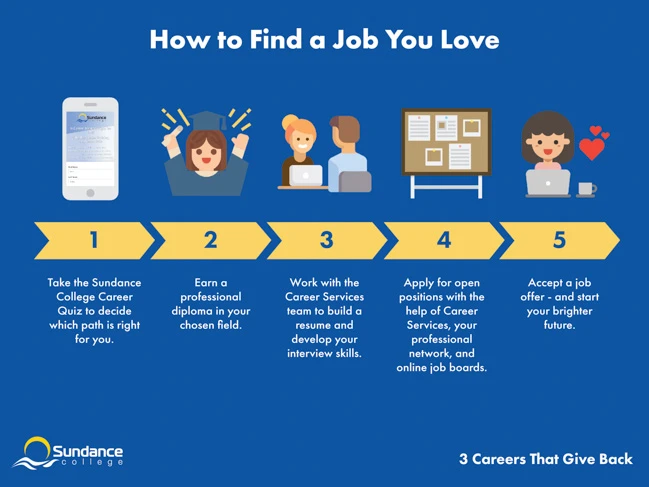Blog / 3 Careers That Give Back
3 Careers That Give Back

Explore our Diploma Programs
- Business, Hospitality, and Legal
- Health and Human Services
- Technology
Table of Contents
The holidays remind us just how important it is to spread joy and make a positive difference in the world. In December, we gather with loved ones to show them we care – and we extend a helping hand to our communities as well. With traditions like holiday cards, gift exchanges, and charitable events, it’s clear why this time of year is known as “the season of giving.”
If the holiday season has inspired you to give back – and you’re also considering a career change – you may be interested in a career path that involves helping others. Here’s a simple guide to help you find your dream job and make a positive impact, all at the same time.
Why Helping Others Is Important
Helping others makes the world a better place for everyone! You don’t need to perform a grand gesture to do good; simple acts like recycling, treating the people in your life with respect, and being an ethical consumer all make a positive difference.
Of course, you could also pursue a career that changes lives. And guess what: careers that help others can result in feeling more fulfilled at work! Sounds like a win-win.
These are our top 3 suggestions for careers that give back:
1. Addictions and Community Service Worker
Addictions and community health professionals are employed by mental health centres, corrections facilities, and other organizations to work with individuals experiencing addiction, victims of domestic abuse, incarcerated individuals, individuals experiencing homelessness, and other vulnerable populations. Depending on your role, you may create treatment or action plans, offer counselling, or provide life skills coaching. Ultimately, you’ll support the health, safety and dignity of the people you’re helping.
What Skills Do You Need?
Being an addictions and community service professional involves working with populations who are often mistreated and marginalized. Traits like empathy and compassion, as well as a willingness to unlearn harmful assumptions and stereotypes, are integral this role.
Core areas of knowledge that will prepare you for work in this field include counselling, the psychology of addiction, and ethics. These topics will enable you to make informed decisions that best serve the community.
How Do You Make A Difference?
Community service workers save lives! By offering resources like addictions counselling, safety planning, or life skills training to people in need, you can increase their quality of living and potentially prevent a fatality.
2. Legal Assistant
Legal assistants support lawyers by doing research, preparing and filing documents, and completing other administrative tasks. If you choose this career, you could be employed by law courts, legal firms, or within the legal department of a large organization.
What Skills Do You Need?
The role of a legal assistant is highly administrative, so strong organizational and communication skills are essential. Interaction with lawyers and clients will require you to express yourself professionally and stay on top of important tasks and documentation.
You’ll need a foundation in legal disciplines to assist your team with their work. Knowing how to conduct legal research and understanding law fundamentals – including real estate, civil, criminal, and family law – are some technical requirements for success in this career path.
How Do You Make A Difference?
How you’ll help others in this role will depend on where you’re employed. For example, a legal team working for the Department of Justice Canada may advise on important topics like Human Rights Law. Or, they might carry out fair and accessible legal procedures for Canadians in cases involving the crown.
Meanwhile, a family law practice will focus on resolving family disputes – which can be an extremely stressful and emotional experience for the client. A legal team working in this field will need to provide their services with compassion and protect vulnerable parties, like children.
Environmental law is another type of law that’s centered on making a positive difference. This field often involves working on cases related to climate change and sustainability, as well as creating new laws and policies that protect people and the environment.
As a professional legal assistant, you could be an essential part of any of these teams – ultimately making the world a better place!
3. Medical Office Administrator
The medical office administrator career path encompasses a range of roles, including medical office assistant and health unit coordinator. Your day-to-day tasks may involve communicating with patients, managing records, billing, and scheduling. However, your job description will ultimately depend on your role and place of employment. Medical office administrators can work in almost any healthcare setting, including long-term care facilities, hospitals, medical clinics, and dental offices.
What Skills Do You Need?
Problem solving and attention to detail are extremely important soft skills for this role. The healthcare sector can be fast paced, and you’ll be required to think on your feet – with little room for error. Because a large part of your day may involve interacting with patients, an aptitude for customer service is also highly valuable.
Of course, you’ll also need to know specialized information to succeed in this role. An education in medical terminology, anatomy, and clinic procedures will equip you to support the needs of your patients.
How Do You Make A Difference?
A medical office administrator may be the first person a patient speaks with when they arrive at a clinic or hospital. Seeking medical care can be stressful or scary; as a medical office administrator, you can make a patient’s unpleasant situation much easier by interacting with compassion and helping the entire process go smoothly.
But that’s not all; the healthcare sector is entirely focused on helping people! Regardless of where you work in healthcare, you’re supporting patient needs. Therefore, this role comes with lots of potential to change lives for the better.

How to Find a Job You Love
These are only a few of the jobs available that allow you to give back. Other options could include working as a pharmacy assistant, doing accounting, taxes or payroll for a non-profit organization, or even starting a business that addresses an important cause. If you’re not feeling fulfilled in your job, it’s probably time for a change!
When considering a career shift, it’s helpful to talk to someone with experience in your desired field. This person can shed light on what they love about their job and offer tips to get you started.
Gaining specialized training is another important step to landing a job you love. A career-specific diploma at Sundance College will equip you with the skills and knowledge to succeed on your new career path. If you start now, you could be working in a field you’re passionate about in less than a year!
Connect with an admissions advisor to help you decide which path is the right fit for you.
Subscribe for more career advice
Blog Categories
Share on:
